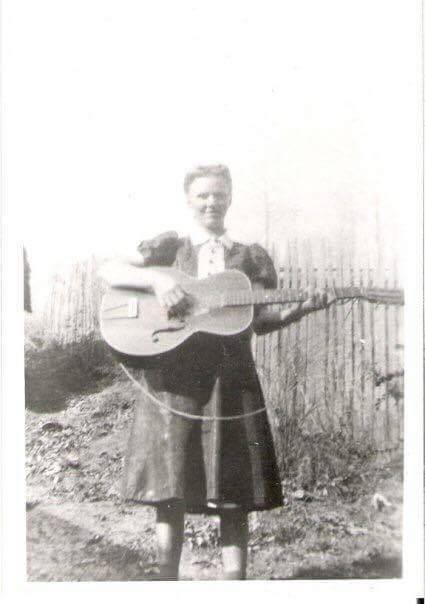My mother was born on a farm in a very rural area here in the mountains in 1924. With no tv and no money for frequent trips to town to see a movie, music became the perfect source of entertainment. Music was her way of escaping her everyday life of hard work. I think it was a way to escape for many Appalachian women, and maybe men too.
Momma’s whole family loved music. Everybody around her either sang or played an instument. Sometimes on Sunday evenings, neighbors would come by with a fiddle or a guitar and play music until late in the night. My mother sang in church, and her uncle taught Shape note music. Melodies soothed their soul and made their life brighter.
My mom’s father had a Victrola and 78 recordings. Although not a singer, he loved listening to the songs. My momma used to crank the Victrola and play all the tunes for him late in the evening after a day’s work. Some of the records were “Let’s be Lovers Again” and “The Wildwood Flower” by the Carter Family. Some were songs by a lady named Molly O’Day. “the Singing Waterfall” and “A Tramp on the Street” were just two of the songs she played on the Victrola and sang while going about her business.
Her mother, my grandmother, loved music also and sang quite a bit. She sang the ballads she learned from her mother and her mother before her. My mother learned these and used to sing them frequently to us. Songs about lords and ladies, tragic love, swordfights and castles that were brought to these mountains from England, Scotland, Ireland, and Wales. Women of Appalachia identified with these tragic songs of the old land and adapted them as the years went by. Women would often sing them at quilting bees or during the rare times when they found some leisure hours. When my mom sang these to me, I was fascinated by the devastating end of most of the ballads. One or both of the characters in the songs died a gruesome death and had their grave dug, not only wide, but deep.
 My mom’s singing was almost an unconscious act with her. Second nature, like breathing. It seemed to me that it just came out without thought. She knew all sorts of songs. The ballads, “The Brown Girl”, “Barbara Allan” and “Fair Eleanor” were sang with complete emotion while Momma peeled apples or cut corn off the cob to can, or made biscuits. Church songs such as “When they Ring Those Golden Bells”, “The Family Who Prays” or “Wayfaring Stranger” came out of her mouth as easy as cool water from a dipper. She would be hoeing in the garden or digging in her flowers and be singing country songs such as, “When it’s Springtime in Alaska” or “A White Sports Coat”.
My mom’s singing was almost an unconscious act with her. Second nature, like breathing. It seemed to me that it just came out without thought. She knew all sorts of songs. The ballads, “The Brown Girl”, “Barbara Allan” and “Fair Eleanor” were sang with complete emotion while Momma peeled apples or cut corn off the cob to can, or made biscuits. Church songs such as “When they Ring Those Golden Bells”, “The Family Who Prays” or “Wayfaring Stranger” came out of her mouth as easy as cool water from a dipper. She would be hoeing in the garden or digging in her flowers and be singing country songs such as, “When it’s Springtime in Alaska” or “A White Sports Coat”.
In the 1950’s she and her sister, Lillie, used to wash clothes together in a ringer washing machine. They would keep a pencil and paper handy. They would listen to the radio and when they heard a song they liked, they would write down the words so they could learn it.
She charmed her children and grandchildren with songs of “Black Jack Davy” and “Jenny Jenkins”. Happy little songs that caused happy little smiles on our faces.
My earliest memories of my mom is of her singing to me. She used to sing me to sleep at night. I would drift off to sleep, thinking about all the stories she sang to me. I miss her voice, her old way of singing that just isn’t heard much anymore. The old ballads are almost forgotten.
In my fast paced world today, I rush to work, the grocery store and the gym listening to Pandora on my cell phone. I always have a song on the tip of my tongue. My friends say my life is a musical; I’m ready to burst out at any second with a tune. If I listen closely I can still hear my mom singing in my ear, remember that catch in her voice, and I know that I’m not so different from her after all.

